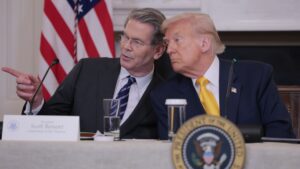Understanding the Economy: Insights from Treasury Secretary Scott Bessent
At Extreme Investor Network, we believe that staying informed about the economy is crucial for making sound investment decisions. Recently, Treasury Secretary Scott Bessent made waves with his comments regarding the current state of the U.S. economy and the need for a "detox period." Let’s dive deeper into what this means and how it affects investors like you.
No Need for a Recession
Bessent clarified on CNBC’s "Squawk on the Street" that his talk of a "detox period" does not necessarily imply a future recession. Instead, he emphasized the importance of a smooth transition as the federal government seeks to cut spending and reallocate resources effectively.
"Doesn’t have to be [a recession], because it will depend on how quickly the baton gets handed off," Bessent stated, indicating that the manner and speed of policy implementation will dictate economic outcomes. This perspective is particularly vital for investors; understanding the government’s fiscal strategies can help in adjusting your investment strategies in real time.
The Current Economic Landscape
The economic landscape isn’t without challenges. Recent indicators, such as slower-than-expected job growth in February, have raised concerns about the economy’s trajectory. Consumer and small business confidence appear to be on the decline, and the stock market has not escaped the turbulence, with the S&P 500 dropping by 6% in March alone.
As investors, it’s essential to stay ahead of the curve. One way to navigate this volatility is to diversify your portfolio, looking into sectors likely to thrive in a changing economic environment.
Government Spending and Employment
Bessent’s comments about government spending being "unsustainable" strike at the heart of the ongoing economic discourse. He pointed out that “we have excess employment in the government, and those people can be moved to the private sector," suggesting that reallocating resources could help alleviate some economic pressures.
For investors, this implies potential opportunities in the private sector, particularly in industries that could benefit from a wave of skilled labor entering the workforce. Investing in training programs or companies that pivot quickly in response to these shifts may yield fruitful returns.
Policy Changes on the Horizon
It’s not just spending cuts that are in play; the Trump administration has also rolled out increased tariffs on major trading partners. This double-edged policy move is aimed at strengthening domestic industries but may have implications for inflation and buying power.
Bessent suggests that addressing expenses will be crucial in resolving the nation’s fiscal health: "In the U.S., we do not have a revenue problem, we have a spending problem." As investors, paying attention to how these policy shifts unfold can inform your decision-making.
Conclusion: Staying Informed is Key
As we watch how the impending transition unfolds, the message is clear: staying informed and adaptable is vital in these unpredictable times. Understanding the interplay of government policy, economic indicators, and market reactions will empower you to make strategic investment choices.
At Extreme Investor Network, we will continue to provide you with the latest insights and analysis to navigate this dynamic economic landscape. Join us in exploring these developments further and equip yourself with the knowledge to thrive in your investment journey.

